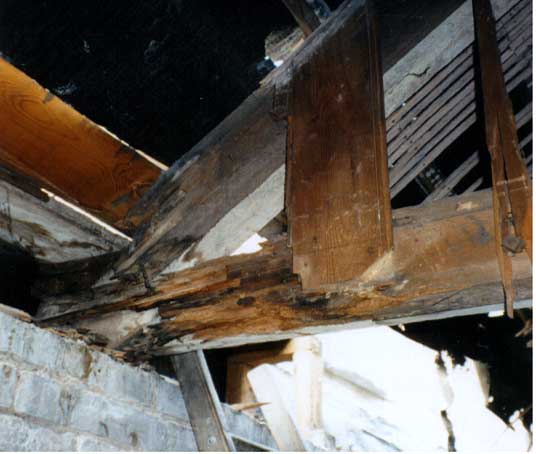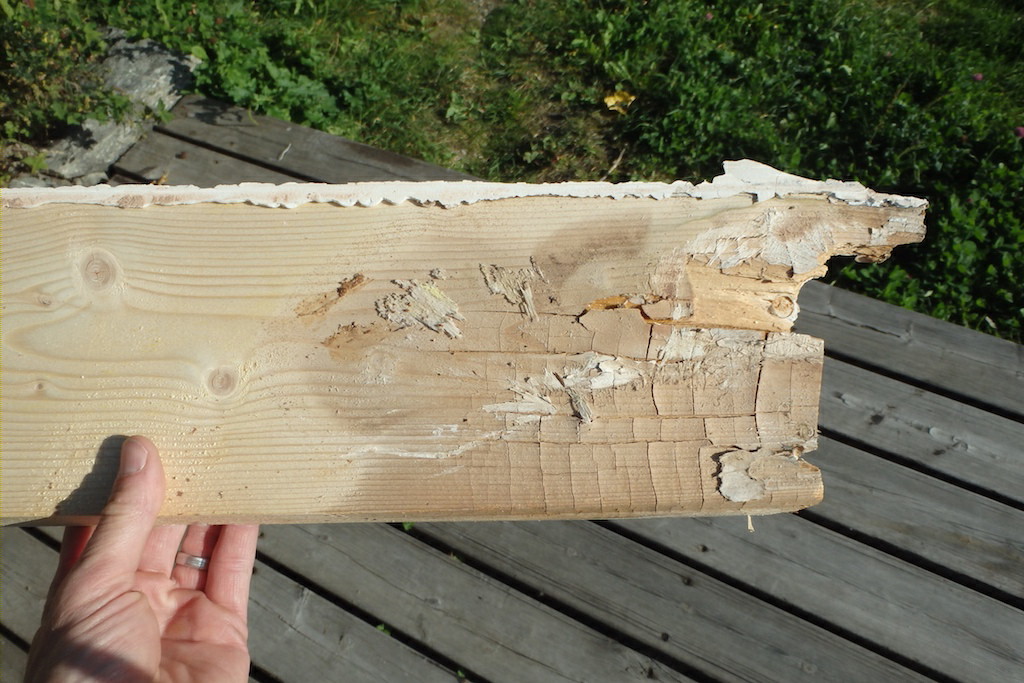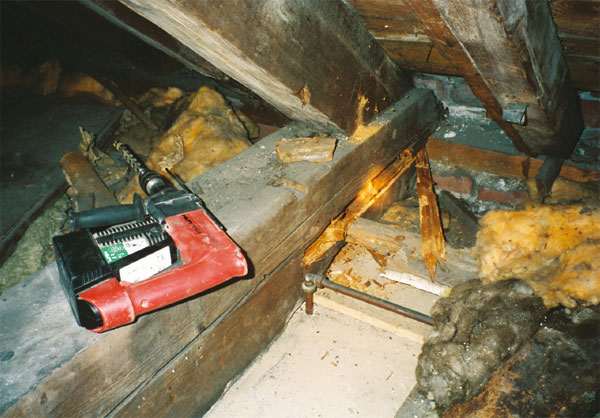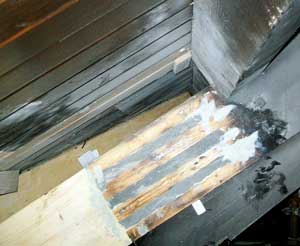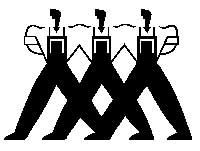How to repair timber Rafters
This project is presented by Property Repair Systems. We show you how to make Structural repairs to Rafters inside roof spaces without destroying sound timber or opening the roof.
Definition of a Rafter
"a sloping beam supporting a roof" (Definitions may vary regionally, as may the spelling)
Rafters connect the roof ridge down to the wall. The large ones are called 'Principal Rafters', the smaller, more numerous ones are called 'Common Rafters'.
Typical Rafter - badly broken, insect attack
Common Location in Buildings
Roofs - sloping from the ridge down to the walls - they often sit on the walls on 'Wall Plates' made of wood, which also rot.
Decay causes
Roof leaks - valley leaks, blocked or damaged gutters and downpipes.
Wet rot and insect attack then destroy the bearing ends.
Wet rot in a Tie Beam and Rafter from a valley leak
Dry rot in a Rafter end - note the cubing effect
Other Factors often seen on Survey
Internal spread of rot along the grain - decay may extend a long way up the rafter from the tie beam
Drill testing reveals the extent of decay - use a Auger
Information required from Survey of a Rafter
Access for Repair - usually from the side face
Note - check any neighboring properties for similar decay through the Party Wall, where there may be a hidden Valley. Compression during rotting often causes cracking to external render.
Size - width, depth, length, bearing support length
Number - more than one may be affected, check both sides of the roof and the wall plate
Timber type - softwood (Pine) or hardwood (Oak), not known
Decay type - wet rot, insect attack (CFB, DWB or Longhorn), Dry rot
Amount to cut off - drill test holes if possible, or tap with a hammer
Final appearance required - visible but painted, decorative natural finish, hidden
Handed - a sketch is useful, with dimensions
Tie Beam - may be affected as well, note the size and method of attachment
Repair Options for Rafters
Repair Types - solid resin or Timber Resin Splice (TRS)
Most popular access Types - side slot, bottom slot - in order to leave the roof intact
TRS Types - Side Slot = Type D, Bottom Slot = Inverted Type C
Special situation - mid span damage - use a doubled ended TRS with a connection at both ends..
Photo Gallery for Truss Repairs by TRS Type
Type A - Solid Epoxy Resin - removable shuttering - drilling up the end grain of the Parent timber on Site
Type B - Solid Epoxy Resin - permanent shuttering - drilling up the end grain of the Parent Timber on Site
Type C - Timber Resin Splice supplied with fitted bars - Top Slot(s) in the Parent timber.
Type D - Timber Resin Splice supplied with fitted bars - Side Slot(s) in the Parent timber
Type E - Timber Resin Splice supplied with Top Slot(s) - drill holes up the end grain of the Parent timber.
Type F - Timber Resin Splice supplied with Side Slot(s) - drill holes up the end grain of the Parent timber.
Type G - Timber Resin Splice supplied with Top Slot(s) - cut Top Slot(s) in the Parent timber.
Type H - Timber Resin Splice supplied with Side Slot(s) - cut Side Slot(s) in the Parent timber.
Heritage Considerations for repairing Rafters
Repair Type - a Conservation Officer will generally prefer a Timber Resin Splice over a Solid Resin Repair
Timber Resin Splice Type D Side Slot in a rafter
TRS Type - a Conservation Officer will generally prefer least damage to the parent timber, so TRS Types E (Top Slot) and F (Side Slot) may be offered, in which the slots are created during Manufacture in the new timber and the Technician drills holes up the end grain of the Parent. This is only feasible if the cut off length is at least 600mm.
TRS Type E Steps - Technician has to drill up the end grain, so needs good clearance to the wall.
More unusual Timber Resin Repair types
Mouldings - sometimes found on the visible decorative faces or edges of Rafters exposed in a room
Connectors - at the joint between the rafter and the tie beam - may have to be restored as original - or use our Tie Connector Kit.
Glulams - can be used as Rafters and Tie Beams.
Structural Calculations for Repairing Rafters
Free of charge - our Design and a Check Calculation - not Insurance Indemnified - we are not Structural Engineers - same day service
Chargeable - independent Structural Engineer - ask for one of our Forms - Indemnified by a Qualified Structural Engineer - allow at least 5 working days.
Tie Structural Data Collection Form - click here for the Form used when we submit your Beam Repair to a Structural engineer.
Epoxy Resins for Repairing Rafters
To buy resins - visit our Resins Shop
Sealing beam end face to a TRS or to seal Shutter Boxes - Quick Setting Wood Filler
Pouring into Shutter Boxes (Type A or Type B) and Top Slots (Type C, E) - Structural Epoxy Pouring Grout
Injecting into Side Slots (Type D and Type F) - Structural Epoxy Pouring Grout plus 1 litre Cartridges and Skeleton Gun
Bonding Bars into timbers on site - for Solid Resin Repairs, Type A and Type B and TRS Timber Kits Type E and Type F - Thixotropic Epoxy Injection Resin plus 400cc Cartridge Kits and Skeleton Gun, with extension tubes for the Cartridges.
Bars used for Repairing Rafters
Bars fitted to TRS Units - Zinc Plated High Tensile Grade 8.8 Steel Allthread
Couplers - available for joining threaded bars in some applications
Bars fitted on Site - either Zinc Plated High Tensile Grade 8.8 Steel Allthread or Epoxy-Glass Bar
Types of Wood used for Timber Resin Splice Rafter Repair Kits
Standard Kiln Dried Softwood (Pine) - white or Redwood Pines, Strength Graded C24
Non standard Kiln Dried Softwood (Southern Yellow Pine, Douglas Fir) - yellow or red striped Pines, Strength Graded C24
Non standard Kiln Dried Hardwood (Oak) - English or American Oaks, not Strength Graded
Non standard Air Dried Hardwood (Oak) - English Oak, will contain insect holes, shakes and splits, will not be dimensionally stable, may shrink, twist and split further in service.
Special Tools for Repairing Rafters - we hire these tools
Cutting Slots - Low Speed, High Torque , reversible electric drilling machine (minimum power - 1000 watts), in conjunction with fully fluted wood Augers
Drilling Holes up the ends of beams - Low Speed, High Torque , reversible electric drilling machine (minimum power - 1000 watts), in conjunction with fully fluted wood Augers
Injecting into Side Slots (Type D and Type F) - 1 litre Skeleton Gun
Bonding Bars into timbers on site - for Solid Resin Repairs, Type A and Type B and TRS Timber Kits Type E and Type F - 400cc Skeleton Gun
Manufacturing Time for Timber Resin Splice Rafter Repair Kits - minimum
Made in standard Kiln Dried Softwood (Pine) - 3 working days, plus 2 working days for delivery
Made in non standard Kiln Dried Softwood (Southern Yellow Pine, Douglas Fir) - 5 working days, plus 2 working days for delivery
Made in non standard Kiln Dried Hardwood (Oak) - 7 working days, plus 2 working days for delivery
Made in non standard Air Dried Hardwood (Oak) - 21 working days, plus 2 working days for delivery
Elm is also available to Special Order - expensive.
Drawings of installation steps for Timber Resin Splice Rafter Repair Kits
Type A - Solid Epoxy Resin - removable shuttering - drilling up the end grain of the Parent timber on Site
Type B - Solid Epoxy Resin - permanent shuttering - drilling up the end grain of the Parent Timber on Site
Type C - Timber Resin Splice supplied with fitted bars - Top Slot(s) in the Parent timber.
Type D - Timber Resin Splice supplied with fitted bars - Side Slot(s) in the Parent timber
Type E - Timber Resin Splice supplied with Top Slot(s) - drill holes up the end grain of the Parent timber.
Type F - Timber Resin Splice supplied with Side Slot(s) - drill holes up the end grain of the Parent timber.
Type G - Timber Resin Splice supplied with Top Slot(s) - cut Top Slot(s) in the Parent timber.
Type H - Timber Resin Splice supplied with Side Slot(s) - cut Side Slot(s) in the Parent timber.
Method Statements for Timber Resin Splice Rafter Kits
Type A - Solid Epoxy Resin - removable shuttering - drilling up the end grain of the Parent timber on Site
Type B - Solid Epoxy Resin - permanent shuttering - drilling up the end grain of the Parent Timber on Site
Type A and B Modified - Solid Epoxy Resin - side slots in the Parent Timber due to lack of cutoff space to end drill
Type C - Timber Resin Splice supplied with fitted bars - Top Slot(s) in the Parent timber.
Type D - Timber Resin Splice supplied with fitted bars - Side Slot(s) in the Parent timber
Type E - Timber Resin Splice supplied with Top Slot(s) - drill holes up the end grain of the Parent timber.
Type F - Timber Resin Splice supplied with Side Slot(s) - drill holes up the end grain of the Parent timber.
Type G - Timber Resin Splice supplied with Top Slot(s) - cut Top Slot(s) in the Parent timber.
Type H - Timber Resin Splice supplied with Side Slot(s) - cut Side Slot(s) in the Parent timber.
Download Data Sheets and Safety Data Sheets for Resins
Structural Epoxy Pouring Resin and Grout - for pouring into slots and into cartridge tubes for injection - Data Sheet - Safety Data - Activator
Safety Data - Base - Safety Data - Powder
Thixotropic Epoxy Injection Resin - for injecting holes using 400cc cartridge tubes - Data Sheet - Safety Data Sheet Activator - Safety Data Sheet Base
Mouldable Epoxy Putty - for filling defects - Data Sheet - Safety Data Sheet
Where to find more reading and photographs of Timber Resin Repairs
www.timber-repair.co.uk - how to repair timber beams
Timber Repair Review 1 - Timber Repair Review 2 - call us for the printed versions - 01626 872886
TRADA Eurocode - resin repair technical report by the Timber Research and Development Association
www.joist-repair.co.uk - how to quickly repair joists and beams of any size
Timber Decay Links for photographs of rots and insect damage
www.dryrot.biz - how to kill Dry Rot in buildings
www.woodworm-info.co.uk - how to kill and prevent woodworm and death watch beetle
www.woodworm-expert-advice-forum.org.uk - all your questions and our answers about woodworm damage and treatment
Technical Help for repairing Rafters
Property Repair Systems expert staff can help you with all kinds of timber repairs and are more than happy to give further information and advice.
Call 01626 872886 or E: Mail us help@propertyrepairsystems.co.uk
Timber Beam Repairs | Contact | About Us | About the Author | Index Page
Property Repair Systems
T: 01626 872886
E: Mail us help@propertyrepairsystems.co.uk
Site written by: David Moore
David Moore, B.A. (Hons.), C.T.I.S., C.R.D.S. Technical Author
Google+
Other Property Repair Systems Sites:
www.boron.org.uk - how to use Boron based insecticides/fungicides to treat timber rots and insect attack
www.dampness-info.co.uk - how to treat penetrating dampness in walls and plaster
www.deck-treatment.co.uk - how to treat patio decks and yacht decks
www.dryrot.biz - how to kill Dry Rot in buildings
www.drywallandfloor.co.uk - membranes for lining damp walls, floors, basements and cellars
www.fire-door-paint.co.uk - upgrade doors to 30 minutes fire resistance
www.joist-repair.co.uk - how to quickly repair joists and beams of any size
www.propertyrepairsystems.co.uk - our Home Site
www.steel-fire-paint.co.uk - treat steel with Intumescent Paint to provide fire protection
www.timber-repair.co.uk - how to repair timber beams
www.woodworm-info.co.uk - how to kill and prevent woodworm and death watch beetle
www.woodworm-expert-advice-forum.org.uk - all your questions and our answers about woodworm treatment DIY
